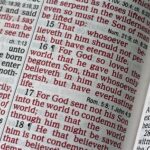Your God Is Too Small
By God’s grace, without earning it, all are granted the status of being considered righteous before him, through the act redeeming us from our enslavement from sin that was accomplished by the Messiah Yeshua. (Romans 3:24, The Complete Jewish Study Bible)
In my early 30s I came across J.B. Phillips’ book, Your God is Too Small that really helped me sort things out about my understanding of God. In the first part of the book, Phillips illustrates more than a dozen commonly held conceptions of God that get in our way when we think about God.
My earliest image of God, “the Grand Old Man,” is number 3 on his list. This one lingered for a long time. The first real crack in the image came when I was 14 in Mr. Pike’s Astronomy class during his lecture on the life cycle of stars. I sat stunned when he talked about the different ways stars can die. If everything dies, even stars, “the Grand Old Man” image of God wasn’t big enough to contain such a reality.
Number 1 on Phillips’ list is the “Resident Policeman.” This conjures the image of God as a cop, walking through the neighborhood of my soul, waiting for me to screw up and hauling me off to jail. The “Resident Policemen” is a “crime and punishment” orientation, focusing on what happens when we break a commandment. There are commandments and breaking them have consequences. But if this is as far as God goes, it paints the mystery at the center of all things as a God of Judgment and Punishment.
There is another way of thinking about commandments. The Hebrew word for commandment is mitzvah (the plural form is mitvot). While mitzvah literally means commandment, it is commonly interpreted as “a good deed.” Thinking of commandments as opportunities to do good deeds leads to a very different picture of God than the “Resident Policeman.” It switches the focus from wrong-doing to right-doing. It switches the focus away from crime and punishment to acts of loving kindness.
Rabbi Moshe Smolkin takes this a step further. Mitzvah is based on the root word tzavta, which means “connection.” In lyrical prose, he describes the connections created when doing good deeds:
“The mitzvot are the Jewish pathways to connect with God and with people. They enable us to see the sacred in the mundane, and they create bridges connecting people across space and time. Mitzvot help us expand our awareness of ourselves and open us to the realization that we are interconnected with the Holy One.”
By moving in both directions, we get a more complete understanding about God. On the one hand, we see how we must be held accountable when we act contrary to God’s purposes. We see the harm we cause and know our responsibility is to turn back to God and our neighbor for forgiveness and make things right again. On the other hand, we see the delight we bring to God and our neighbor when we fulfill a commandment.
Our personal understanding of God has a powerful impact on our lives. I saw this in my mom. After Dad died, her deep grief darkened her usual sunny disposition and she could be quite a bear to be with. After a couple of years, I noticed her spirit brighten again. I told her about this and asked her what happened. Ma said it was because of a minister she watched on television. His message about God’s grace, God’s unmerited favor, had broken through the God of Judgment she grew up with. Her last few years were marked by this renewed brightness of spirit. The realization of God’s unconditional love does this to a soul.
The Jewish mystical tradition called Kabbalah gives an extra boost to the idea of doing good deeds. According to this tradition, everything in creation contains a spark of the Divine. Any time we do something good for each other, we are, in effect, raising holy sparks.
Prayer: Eternal God, give me eyes that see and a heart that is open. Guide my steps along the way and help me to stay true to your purposes. Help me to be a blessing to everyone I meet. Help me to raise holy sparks!
Joe Bulko

